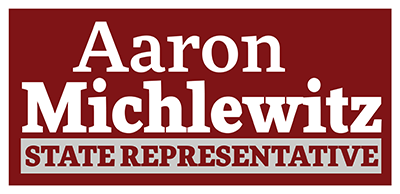STATE HOUSE, BOSTON, OCT. 16, 2019…..The House moved to close the fiscal year 2019 books Wednesday with near-unanimous approval of a $723 million supplemental budget that would stash $400 million of last year’s surplus in reserves and spend millions more on the MBTA and other priorities, while also setting a schedule for voting in 2020.
Members voted 151-1 Wednesday night to pass the bill (H 4127) after a lengthy session dotted with hours of public inactivity. Boston Democrat Rep. Russell Holmes cast the lone dissenting vote.
Earlier in the day, House Ways and Means Committee Chairman Aaron Michlewitz told his colleagues that the supplemental budget “makes critical investments the commonwealth needs while being prudent with spending to be better prepared for any economic turmoil that may await us in the coming months.”
Part of that financial prudence is the deposit to the stabilization fund, which would increase the fund’s balance to $3.2 billion. Michlewitz said that would be “the highest it has ever been monetarily.”
The House also recommended spending down some of the revenue surplus — which Michlewitz said totaled $1.1 billion over expectations — by backfilling some education accounts so that final fiscal 19 funding will be equivalent to the levels approved in the current fiscal 2020 budget. Among the investments is an additional $17 million in local scholarships, nearly $2 million additional for special education circuit breaker costs, $2.4 million for regional school transit and $2 million more for homeless school transportation.
“In education, we are building off the good work we achieved in the 2020 budget and are calling for a number of additional investments, including $17.5 million for charter school reimbursement so that we can get to the same level of funding in FY19 that we were able to achieve in FY20,” Michlewitz said.
A $50 million outlay for the MBTA is also among the House’s additional investments. Michlewitz said the money would be used “for accelerated capital and maintenance projects, an issue that we continue to hear from our constituents about and take seriously about having a long-term discussion going forward.”
Four months ago, Gov. Charlie Baker asked the Legislature to approve $50 million in emergency one-time funding from the expected fiscal 2019 surplus to hire additional engineers, inspectors, consultants and bus drivers to shuttle passengers during route closures so that the MBTA would be able to accelerate repairs using “more aggressive” service closures to give work crews extended time to work on the tracks.
The governor’s request (H 3934) has been pending before the House Ways and Means Committee since it was filed in late June.
On the policy side, the bill authorizes five days of early voting before the March 3, 2020 presidential primary, and it also sets the state primary for Sept. 1, 2020.
Democratic House leaders did not include language the Republican governor proposed in his supplemental budget bill allocating $5 million for fentanyl interdiction efforts. House Minority Leader Brad Jones filed an amendment seeking to restore that funding, but the measure was rejected 38-114.
Progress on the 96 amendments that had been filed by members was slow for much of the day, but late in the evening, the House bundled roughly 70 remaining amendments into a single package that was unanimously approved. The fiscal note attached to the package pegged its estimated cost — much of which focused on local earmarks — at $9.35 million.
The House’s supplemental budget also includes $8.4 million for contamination testing for potential per- and polyfluoroalkyl substances that have been detected in public water supplies in Ayer, Barnstable, Harvard, Hudson, Mashpee, Middleton, Shirley and Westfield, according to the Department of Environmental Protection. The bill also includes a transfer of $20 million to the Massachusetts Clean Water Trust to support PFAS remediation projects
“Despite the use of PFAS chemicals in everything from Teflon to stain-resistant fabrics for more than half a decade, the federal EPA only began testing for these so-called forever chemicals a few years ago as their potential health risk came to the forefront,” Hogan said. “My experience supporting towns across my district as they addressed PFAS issues made clear the challenges our municipalities face as ground zero of this ongoing public health and environmental emergency. We need to give the ever-growing number of comms affected by PFAS the tools to respond.”
In a campus-wide email sent Wednesday, University of Massachusetts Boston Chancellor Katherine Newman praised the House for including in its budget bill a $20 million program to match private contributions to public college and university endowments, with half of that amount set aside for the UMass system.
“Endowments have become more important than ever because of the financial challenges facing higher education today, especially public institutions. That’s why I’ve made fundraising one of my top priorities. And having doubled our fundraising during a record year in fiscal 2019, UMass Boston is well-positioned to take advantage of the Endowment Incentive Program,” Newman wrote. “Under the program, philanthropic gifts to the state’s public colleges and universities would be matched at a rate of $1 for every $2 in private contributions.”
Newman was also pleased with the House’s addition of $17.5 million to the MASSGrant scholarship program, which she said is “the state’s largest need-based scholarship fund and as such a critical program for UMass Boston given our mission and the population we serve.”
** This article was published on MassLive.com By Colin A. Young and Chris Lisinski of State House News **
